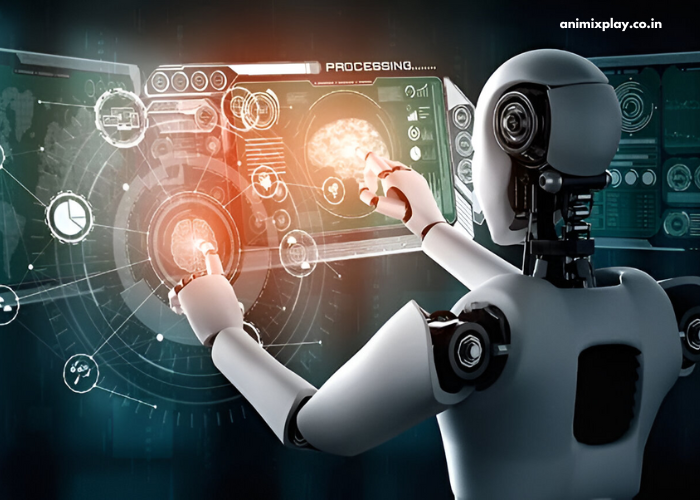Artificial Intelligence (AI) has rapidly evolved from a niche academic field to a transformative force reshaping industries and societies. As we move further into the 21st century, AI’s potential to influence every aspect of human life—from healthcare to transportation, education, and beyond—continues to grow. This article delves into the promising future of AI, exploring its potential advancements, implications, and profound impacts on society, industries, and the global economy.
The Evolution of Artificial Intelligence
AI began as a theoretical concept in the mid-20th century, with early pioneers like Alan Turing laying the groundwork for machine-based computation. Since then, the field has undergone exponential growth, with advancements in machine learning (ML), deep learning, and natural language processing (NLP). Today, AI systems like OpenAI’s GPT-4 are capable of performing complex tasks, demonstrating creativity, and adapting to various scenarios with remarkable precision.
The progression of AI can be categorized into three stages:
- Artificial Narrow Intelligence (ANI): This is the current stage, where AI systems excel in specific tasks, such as facial recognition, language translation, and autonomous driving.
- Artificial General Intelligence (AGI): The next frontier, AGI aims for machines that possess human-like cognitive abilities across diverse tasks.
- Artificial Superintelligence (ASI): A theoretical stage where AI surpasses human intelligence in all aspects, potentially leading to transformative possibilities.
Emerging Trends in Artificial Intelligence
AI is advancing at an unprecedented pace, with several trends shaping its future trajectory:
- Edge AI: Processing data closer to the source (e.g., IoT devices) to reduce latency and enhance privacy.
- Explainable AI (XAI): Ensuring transparency in AI decision-making to build trust and comply with regulations.
- Generative AI: Tools like ChatGPT and DALL·E, capable of creating content ranging from text to art, represent the growing creative capabilities of AI.
- Quantum AI: Combining quantum computing with AI to solve problems that are currently unsolvable by classical computers.
- AI and Ethics: Increased focus on ethical AI development to prevent bias, ensure fairness, and mitigate risks associated with autonomous decision-making.
The Impact of AI on Industries
The transformative power of AI is evident across various industries, driving innovation, efficiency, and new business models.
- Healthcare: AI is revolutionizing diagnostics, drug discovery, and personalized medicine. Algorithms can analyze medical images with high accuracy, predict patient outcomes, and assist in creating tailored treatment plans.
- Education: Adaptive learning platforms powered by AI offer personalized education experiences, catering to individual learning styles and needs. Additionally, AI chatbots provide real-time assistance to students.
- Finance: AI-driven algorithms streamline trading, fraud detection, and customer service. Robo-advisors have democratized investment opportunities, while predictive analytics enhance financial decision-making.
- Transportation: Autonomous vehicles and AI-powered logistics systems are optimizing transportation networks, reducing accidents, and improving fuel efficiency.
- Retail: AI is reshaping the retail experience through personalized recommendations, inventory management, and automated checkout systems.
- Agriculture: AI-driven precision agriculture techniques, such as crop monitoring via drones and predictive analytics for weather patterns, are boosting productivity and sustainability.
The Role of AI in Society
Beyond industries, AI is impacting society in profound ways:
- Improved Quality of Life: AI-powered applications in smart homes, wearable health monitors, and virtual assistants are enhancing daily life.
- Economic Growth: According to PwC, AI could contribute up to $15.7 trillion to the global economy by 2030, driven by productivity gains and consumption enhancement.
- Challenges to Employment: While AI automates repetitive tasks, it also creates new job opportunities. However, there is a pressing need for reskilling and upskilling to prepare the workforce for AI-driven roles.
- Ethical Concerns: Issues such as data privacy, algorithmic bias, and the potential misuse of AI highlight the importance of responsible development and governance.
The Future of AI
As AI continues to evolve, several key developments are anticipated:
- Interdisciplinary Integration: AI will increasingly integrate with fields like neuroscience, biology, and material science, leading to breakthroughs in understanding complex systems.
- AI in Governance: Governments are expected to adopt AI for better policymaking, resource allocation, and crisis management. AI can provide real-time data analysis for informed decisions.
- Sustainability Initiatives: AI will play a crucial role in tackling climate change by optimizing energy use, predicting environmental changes, and aiding in the development of renewable energy technologies.
- AI in Space Exploration: AI will assist in analyzing data from space missions, planning interplanetary travel, and enhancing our understanding of the cosmos.
Ethical and Regulatory Considerations
The rapid growth of AI underscores the need for robust ethical frameworks and regulatory measures. Key considerations include:
- Bias and Fairness: Ensuring AI systems are unbiased and represent diverse perspectives to prevent discrimination.
- Transparency: Developing AI systems with clear and understandable decision-making processes.
- Accountability: Establishing accountability mechanisms to address misuse or errors in AI applications.
- Global Collaboration: Encouraging international cooperation to create unified AI governance standards.
Conclusion
The future of artificial intelligence is both exciting and challenging. As AI continues to advance, its potential to solve complex problems, improve quality of life, and drive economic growth is unparalleled. However, it also raises critical questions about ethics, privacy, and societal impact. Navigating this future requires a balanced approach that embraces innovation while ensuring responsible development.
AI’s journey is just beginning, and its transformative power will undoubtedly shape the world in ways we can only imagine today. By fostering collaboration between governments, industries, and academia, we can harness AI’s potential for the greater good, creating a future where technology and humanity coexist harmoniously.




